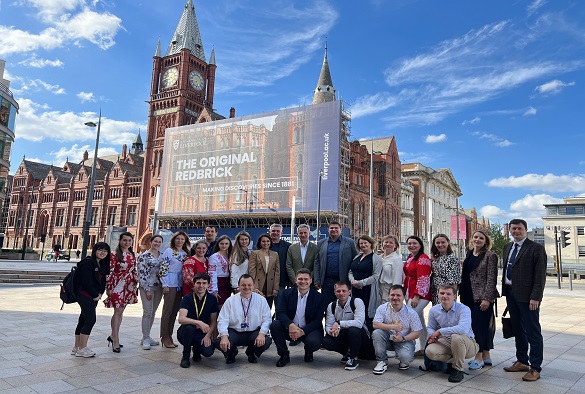The University welcomed senior leaders, led by the Rector Vasyl Karpusha, and researchers from Sumy State University (SumDU), Ukraine to campus to celebrate our partnership and explore opportunities to further strengthen our collaboration in areas of education and research.
The University twinned with Sumy State University last year to share resources, learning and ideas and since then there has been significant collaboration including summer school activities and student exchanges.
Colleagues have also been working on a range of projects from sharing experience on brand and marketing though to developing collaborative online learning platforms.
In addition, earlier this year, research connections were established through a digitalisation and digital transformation research programme to build stronger research links and develop longer term partnerships between the two organisations.
The programme has supported 18 researchers from Sumy State who have worked with research mentors here at the University for the last six weeks on a range of projects. In addition, a further 30 “virtual fellows” have been engaging in similar activities working remotely from Ukraine with Liverpool mentors.
During the visit to Liverpool, representatives from Sumy State University met with colleagues from across the University including Libraries, Galleries and Museums, the International Development team, External Relations, the Academy and Faculty APVCs.
A Twinning workshop focused on issues and opportunities for collaboration in Education & Mobility. A Research Twinning symposium involved presentations from 14 research fellows as well as a review of the research programme to date and discussions about future collaborations that support the University’s research priorities including areas from Management, Finance and Economics, through to Public Health, Policy and Systems and Engineering, Manufacturing and Energy.
Professor Gavin Brown and Rector Vasyl Karpusha
Professor Gavin Brown, Pro-Vice-Chancellor for Education at the University of Liverpool, said: “We are very proud of our partnership with Sumy State. We have been working together for over a year now so it was wonderful to meet in person our friends from SumDU and with researchers who have been collaborating with us. We have developed strong links across a number of areas of education and more recently across research. We enjoyed some great discussions and have identified new opportunities to take forward together.”
Professor Igor Potapov, from the University of Liverpool’s Department of Computer Science, is leading the digitalisation and digital transformation research project.
He said: “It was fantastic to welcome in person leaders and research fellows from SumDU to Liverpool and to discuss and celebrate our research collaboration. Through the project we are developing specific research links and we have been able to review our progress and explore areas of mutual interest and identify areas for future collaborations that we hope will have an impact on the recovery of Ukraine.
“I would like to express my special gratitude to Dr Konstantin Kyrychenko, Ukrainian co-lead on this project, who helped to resolve any issues we encountered in organising the logistics of this visit. His input and support played a big role in the success on this project.”
Anzhela Stashchak, from the Cormack Consultancy Group (CCG) who co-ordinate the UK-Ukraine Twinning Initiative, said: “Cormack Consultancy Group is truly humbled by the range of cooperation between the two universities, level of engagement of two partners, active position of both. So many diverse and impactful projects have been carried out and are being planned, that it’s amazing to see them all coming live and making a true difference to higher education, research, student and staff support for Ukraine.
“The Twinning Symposium organised by the University in the framework of the UKRI funding opportunity gave a good chance to discuss what has been achieved, learn from each other and brainstorm for further cooperative actions.”
The University and Sumy State University’s research collaboration is supported by the Universities UK International’s UK-Ukraine R&I twinning grant scheme.
